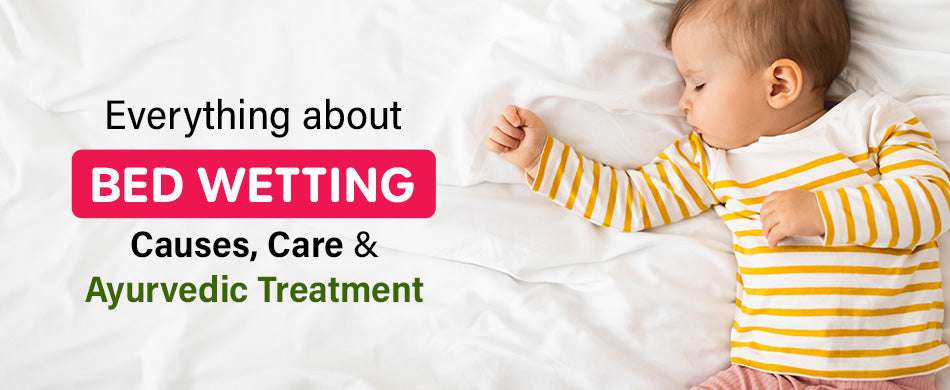Everything about Bed Wetting: Causes, Care & Ayurvedic Treatment
- by Baby Organo

The most frequent type of bed-wetting, medically called primary nocturnal enuresis, occurs in children with daytime bladder control but have never been dry at night for a minimum of six months. This state is known as Sayyaa mantra in Ayurveda. Bedwetting is uncomfortable and unpleasant for children over three.
In addition to the social stigma, bed-wetting causes a lot of washing, interrupts sleep patterns, and causes sleep-related disorders.
Parents often blame themselves for their children's bedwetting. People once thought kids who wet their bedding had a mental illness. The bed-wetting may be caused by delayed bladder neuron maturation.
The natural alternative to bedwetting treatment is Ayurveda.
Causes of Bed Wetting
Physical and psychological trauma often causes urinary incontinence. People of all ages including children, may pee in bed for these reasons:
Mental health issues like stress, anxiety, and insecurity can induce bedwetting.
- The bladder's diminutive size
- The infection that causes a UTI
- Medical conditions affecting the nervous system, including complications following a stroke
- An enlarged prostate
- Abnormal breathing pauses while sleeping, often known as sleep apnea
- Cystic fibrosis
- Infections of the urinary tract
Other factors that can cause bedwetting include hormonal swings, constipation, and bowel irregularities. Overnight, the body produces the antidiuretic hormone (ADH) to help decrease urine production. The bladder can keep urine overnight due to the regular generation of urine. Another possible reason for bedwetting is poorly managed blood sugar.
Are there Any Natural Home Remedies for Bedwetting?
To assist your child in becoming bedwetter-free, here are a few suggestions. These are the methods and techniques that are well-tested and usually work.
In the evening, drink less fluids
After 3 p.m., the kid should resist the urge to drink too much water, eat too much chocolate, drink too much coffee, or ingest too much citrus. It is acceptable to drink the usual fluids with meals.
The child needs to use the restroom before going to bed
Get the kid up and out of bed at least once a night to use the restroom. The importance of getting up to use the potty first thing in the morning should take precedence over the child's concentration on staying dry throughout the night.
Follow a motivating strategy like offering stickers and charts as incentives
Some kids respond well to a strategy that uses incentive stickers and charts. When the kid stays dry all night, they get a sticker for their chart. You can get a reward after you collect a specific quantity of stickers. Most children with a low relapse rate achieved substantial improvement (14 consecutive dry nights) when given such a motivating strategy, even when they were younger (2 wet nights out of 14).
Ensure that the youngster can easily and safely reach the restroom
Put in nightlights and clear the area between their bed and the bathroom. If needed, provide a portable toilet.
They say that using diapers or pull-ups at home could make it harder to get up and go potty, so it is best to avoid them. Doing pull-ups can give a child a sense of empowerment and self-assurance. Many parents only let their kids use them when camping or having sleepovers.
The parents' attitude toward it motivates the youngster to stop bedwetting
Straighten up
Do not make bedwetting an issue. Do not accuse or reprimand the child. Blaming and disciplining the child only makes the situation worse because the child has no control over the bedwetting.
Show tolerance and encouragement
Constantly reassure and inspire the youngster. The family should adhere to a "no teasing" policy. No one, not even close relatives, may make fun of the youngster because of the bedwetting. Never bring up the subject of bedwetting in a family gathering.
The responsibility for staying dry does not lie with the parents; it is on the youngster. However, as parents you have to guide the kid to know you are here to support them as they go through this. If it applies, you can tell him that a close relative of his handled a similar problem and had it resolved.
Helping the child out with the clean-up is a good idea
Waterproof bed coverings, washable absorbent sheets, and room deodorizers can enhance comfort and decrease damage.
Children who can get up at night to use the restroom but do not appear to grasp its significance are ideal candidates for self-awakening programs.
One method is to sit with the youngster each night before bed and go over the steps of getting out of bed to use the restroom.
Daytime rehearsal is another tactic
Just put the little one to bed and act like they're sleeping whenever they must go potty. After a short interval, they should get out of bed and go to the bathroom.
If self-awakening programs do not work, one option is to use parent-awakening programs. The child's request is the only prerequisite for using these applications. As a final resort, you should avoid disturbing your sleep.
It is customary for parents to wake their children up before they go to sleep
For this to be effective, the kid must figure out where to go potty. Over time, the baby must learn to wake up readily by sound alone.
Doing this for seven consecutive nights will either heal the youngster or prepare them for self-awakening alarms or programs.
The therapy for bedwetting now mostly involves using alarms
After 12 to 16 weeks of use, most children can discontinue bedwetting.
Discontinuing the alarm can cause some children to resume wetting the bed (relapse). The behavioural conditioning that occurs during the first treatment cycle, however, makes the return of the alarm system a quick success. Most people succeed with this strategy over time if they stick with it.
These alerts take time to be effective. The kid needs to give the alarm a few weeks - if not months - of use before writing it up as useless.
Both auditory and tactile (buzzing) alerts are available
It works because the urine's moisture can trigger an alert by opening a hole in the sensor. You can attach the sensor to the kid's underwear or sleeping pad.
Once the child finishes using the restroom, they return to their bedroom, change into clean clothing, clean the sensor, turn off the alarm, and then go back to sleep.
Alarms are better than medicines for kids because they do not create any unwanted side effects. Most people think that every kid who is seven years old or older should try a security system.
The kid must use the alarm for it to work. A lot of drive and enthusiasm is required from the parents and the youngster.
Anything that claims to be a fast "cure" for bedwetting should raise red flags. That is not the case. Most youngsters need time, incentive, and patience to stop bedwetting.
Significant Directions and Effective Ayurvedic Treatments
Because they are powerless over it, children do not deliberately pee on the bed. Avoid making them feel bad about themselves by acting out in anger or disdain. Try to understand and help.
Verify that the youngster is receiving the recommended amount of sleep. Maintaining a regular sleep schedule will facilitate waking up at the sign of full bladder.
Ayurvedic medicine Swarnaprashan promotes overall health and holistically addresses the root causes of bed wetting.
So that threadworms do not keep you up at night, make sure your bowels are clear. They play a significant role in the development of bed-wetting.
It would help to cut back on gas-producing foods, including potatoes, green gram, chocolate, tea, and coffee. Avoid consuming liquid meals a few hours before you want to turn in for the night.
Before going to sleep, the youngster must empty their bladder. Two or three hours after they sleep, set an alarm to wake them up for the bathroom. To combat this, doing exercises stretching the bladder is quite helpful.
Adult bed-witting can result from stress from the loss of a loved one, parental divorce, a romantic breakup, etc. Exercise, meditation, massage, yoga, relaxation, etc. can reduce stress.
Communicate with your feelings and do something positive before tension causes bed-wetting.
While the oil is heating, brown the seeds of one teaspoon of coriander. Toss in a teaspoon of babul gum, sesame seeds, and pomegranate blossoms; then, crush the mixture to a fine powder.
Before night, mix the powder with crystal sugar and provide a teaspoonful. The benefits of powdered Sarshapa with half a cup of milk before bedtime are well-documented.
How Swarnaprashan Can Help to Cure Bedwetting?
Swarnaprashan, an Ayurvedic treatment that uses gold-infused medicinal ghee, boosts immunity and well-being.
Its immune-boosting effects may indirectly help manage bed-wetting by addressing underlying health issues. Ayurvedic treatments for bed-wetting focus on enhancing the urinary tract and neurological system.
Also Read: Everything you need to know about Swarnaprashan
Key Takeaways
For children, in particular, bedwetting can be a source of great anxiety and a drag on their quality of life. By treating the root causes of the problem, bolstering the urinary system, and encouraging general health, Ayurveda provides a comprehensive method for controlling this issue.
Improved bladder control and support in overcoming bed wetting are the goals of Ayurvedic treatment, which involves balancing the doshas, employing herbal medications, following a balanced diet and lifestyle, and using home remedies.
Swarnaprashan adds Ayurvedic concepts to bedwetting care and supports the child's well-being by addressing probable causes. Seek the advice of an experienced Ayurvedic physician for individualized care.
- Posted in:
- Parenting tips





